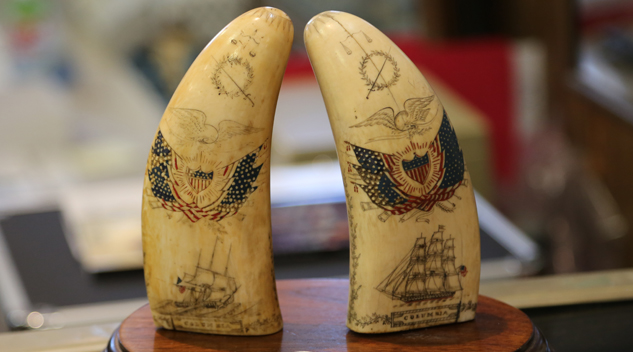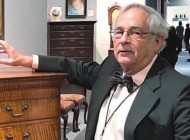By W.A. Demers, Senior Editor
HARTFORD, CONN. — A public hearing regarding a proposed ivory bill for Connecticut, SB 294, was conducted on March 6 at the state capitol. The Environment Committee presented the session in the Legislative Office Building, with signups for speaking at the hearing beginning at 9 am in the lobby. It turned out to be a marathon session, with some speakers having to wait up to ten hours to make their point.
It’s not that there is anything astonishingly new in SB 294, an Act Prohibiting the Sale and Trade of Ivory and Rhinoceros Horn in Connecticut. The move to protect the endangered species has been percolating for years, with animal rights groups demanding the most severe restrictions and the antiques trade, historians, collectors, historical societies and museums calling for what they regard as common sense amendments that protect genuine antiques and historic objects that have ivory in them.
The legislation defines “ivory” as “a tooth or tusk from a species of elephant, hippopotamus, walrus, whale or narwhal, or a piece thereof, including any product that contains or that is advertised as containing ivory”; and “rhinoceros horn” as “the horn or a piece or derivative thereof, such as powder, of a species of rhinoceros, including any product containing or advertised as containing rhinoceros horn.”
The “sales” the act would prohibit include “selling, trading, bartering for monetary or nonmonetary consideration, or giving away in conjunction with a commercial transaction.”
Antiques dealers like Nathan Liverant & Son of Colchester, Conn., state unequivocally that they abhor the illegal poaching of elephants and rhinoceros and encourage the use of all measures to combat this crisis. “However, we believe it is imperative to protect genuine antiques and historic objects and create a reasonable antiques exemption,” said the firm’s Arthur Liverant and Kevin Tulimieri in an email sent out the day before the public hearing asking support from friends and colleagues.
“Our concerns with SB 294 begin with the inclusion of ‘walrus, whale and narwhal.’ When this is combined with a requirement for any ivory to be ‘a fixed component of a larger manufactured item…volume of the ivory component is less than 20 percent…item is not made wholly or primarily of ivory…or minimally changed by carving,” all antique scrimshaw would be put in jeopardy. With New London, Conn., a center of Nineteenth Century whaling, this would gravely impact an important part of our state’s history.”
The firm also took exception with the 20 percent threshold, finding it arbitrary and, therefore, unacceptable, as it would ban numerous genuine antiques.
Other concerns were raised, including one over a provision that states that confiscated ivory can be destroyed. “This puts antiques and artifacts that are misidentified by the DEEP enforcers of the law in jeopardy of permanent loss. The items should simply be used for education or donated to museums or scientific institutions.” the firm said.
Weighing in, also, Mystic Seaport Museum stated “This bill, as written, has the potential to financially impact individuals who have invested significant funds on artifacts that are now rendered valueless; impact any 501-C3’s ability to collect and deaccess any object containing ivory; demotivate owners to donate items that have been rendered valueless, thus negating any tax incentive they would have previously received; make it impractical, if not impossible, to borrow marine mammal ivory for exhibits; and create significant fiscal impact on the state in terms of enforcement personnel required.”
“It was a marathon session of a public hearing and I believe our concerns were well represented,” said Arthur Liverant and Kevin Tulimieri in an email sent out to friends and colleagues afterwards. “We are enormously grateful to Representative Mitch Bolinsky of Newtown and Representative Brian Smith of Colchester for their efforts to help us address the committee and support responsible ivory legislation.
“We are also deeply grateful to Dr Thomas Loughman, director and chief executive officer of the Wadsworth Atheneum, for attending the public hearing and waiting for more than ten hours to speak. His powerful and eloquent testimony spoke directly to the need to protect the legal trade in genuine historic artifacts, antiques and works of art made out of ivory or that may contain ivory elements. Although museums are offered an exemption from this proposed legislation, Dr Loughman clearly informed the committee that a healthy and legal market is important to all cultural institutions. Not only does this allow historic items to be acquired by cultural institutions, it is critical in efforts to preserve and maintain our shared cultural heritage.
“We would also like to give a special mention and thank you to Harold and Jan Kritzman of Olde Towne Coin Company for their perseverance during the long day. Jan offers a special perspective and a direct challenge to the Environment Committee to maintain their focus on the important and tangible issues that face the residents of Connecticut.”
The bill will now be discussed by the committee. “Hopefully, the changes we addressed to the committee will be instituted. We will keep you informed as soon as we have any new information to share,” concluded the dealers. SB-294 can be viewed with this link: https://cga.ct.gov/asp/cgabillstatus/cgabillstatus.asp?selBillType=Bill&which_year=2020&bill_num=294.





